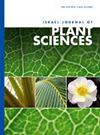Genetic variability, heritability, genetic advance, association between fruit yield and yield components of okra (Abelmoschus esculentus L. Moench) accessions grown in two different years
IF 0.7
4区 生物学
Q4 PLANT SCIENCES
引用次数: 0
Abstract
Genetic improvement of okra for yield is significant because of the nutritional, economic and health benefits inherent in it and to overcome the low genetic potential of the existing varieties and environmental factors which are the major constraints to okra yield. Therefore, this study was carried out to understand the genetic nature of yield, its association with yield components on which selection can be made and to determine the effect of different years on genetic gain. The experiment involved the evaluation of twenty okra accessions in the rainy seasons of year 2019 and 2020 in a randomised complete block design. Data were collected on fourteen characters and analysed. Genotype × Year was highly significant for all the analysed characters. High heritability and high genetic advance as percent of mean were recorded for most of the characters in both years indicating that these traits were less influenced by the environment and presence of additive gene action. Genotypic coefficient of variation, heritability and genetic advance were observed to be higher for some traits in 2019 but lower for those traits in 2020. Pod yield had positive correlation with only plant height at 50% flowering, pod length, number of seeds per pods and peduncle length in both years 2019 and 2020 while the remaining were negatively correlated with pod yield in both years except petiole length and number of pods per plant. Therefore, selection based on these traits could be highly rewarding and may not be considered based on different years.不同年份秋葵(Abelmoschus esculentus L. Moench)材料的遗传变异、遗传力、遗传进步及其产量与产量成分的关系
对秋葵进行产量遗传改良具有重要的意义,因为它具有内在的营养、经济和健康效益,并克服了现有品种遗传潜力低和环境因素是秋葵产量的主要制约因素。因此,本研究旨在了解产量的遗传性质及其与可进行选择的产量成分的关系,并确定不同年份对遗传增益的影响。该试验采用随机完全区组设计,对2019年和2020年雨季的20株秋葵进行评估。收集了14个字符的数据并进行了分析。所有性状的基因型×年份均极显著。大部分性状的遗传力和遗传超前率均较高,说明这些性状受环境和加性基因作用的影响较小。部分性状的基因型变异系数、遗传力和遗传先进性在2019年有所提高,但在2020年有所降低。2019年和2020年的荚果产量均与50%开花期株高、荚果长、单荚种子数和花序梗长呈正相关,其余年份除叶柄长和单株荚果数外均与荚果产量呈负相关。因此,基于这些特征的选择可能是非常有益的,可能不会考虑基于不同年份的选择。
本文章由计算机程序翻译,如有差异,请以英文原文为准。
求助全文
约1分钟内获得全文
求助全文
来源期刊

Israel Journal of Plant Sciences
生物-植物科学
CiteScore
1.90
自引率
0.00%
发文量
17
审稿时长
>12 weeks
期刊介绍:
The Israel Journal of Plant Sciences is an international journal of extensive scope that publishes special issues dealing with all aspects of plant sciences, including but not limited to: physiology, cell biology, development, botany, genetic
 求助内容:
求助内容: 应助结果提醒方式:
应助结果提醒方式:


